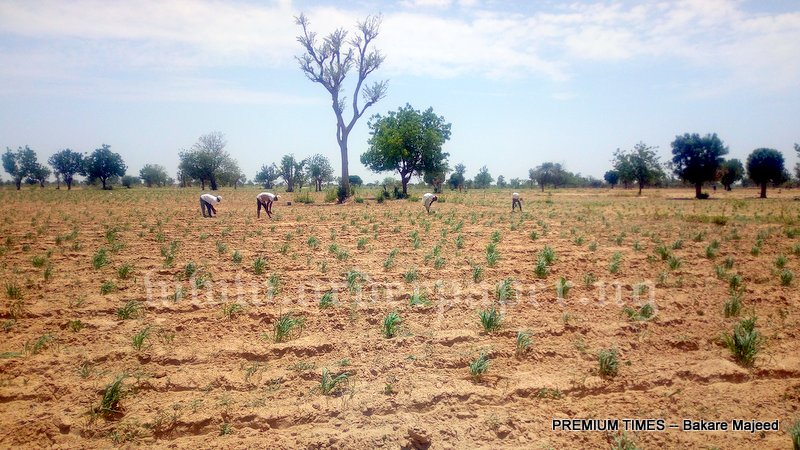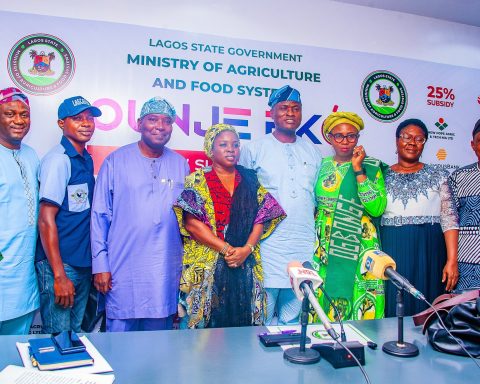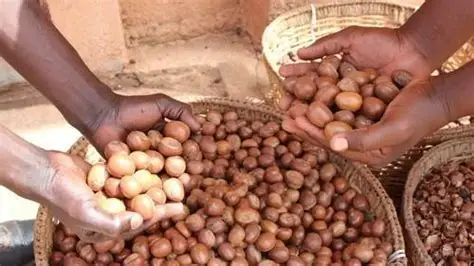Alliance for Green Revolution in Africa (AGRA), said they are providing Nigerian farmers with maturing seeds.
Join our WhatsApp ChannelAlliance for Green Revolution in Africa (AGRA), has said that farmers in Nigeria are being supported with high yielding and early maturing seeds in drought-prone areas in the country.
AGRA Country Director, Dr Kehinde Makinde said this during an interview with journalists.
He said apart from the fact that farmers in Nigeria are being supported with high yielding and early maturing seeds in drought-prone areas in the country, AGRA-Nigeria also enhances farmers’ access to other farm inputs like fertilizer, and other crop protection products.
“As a friend to the farmers, AGRA-Nigeria has rolled out key initiatives to help smallholder farmers cope with the adverse effect of climate change.
We also enhance farmer access to other farm inputs such as fertilizers, and crop protection products to help them fight pests and diseases like Fall Army Worms (FAW).
“We also offer extension and advisory services through Community Based Advisors working alongside Government Extension Agents and this is translating to increased productivity and incomes.
“With increased productivity and incomes, farmers are better able to cope with the adverse effects of climate change”, he said
He said in terms of diversification of the crop system, AGRA-Nigeria is helping farmers to diversify their various crop systems from deep-rooted crops to shallow-rooted crops.
According to him, “these diversification effects will help in improving the incomes that have been generated from farming”.
Dr Makinde said the possible consequences of climate change include job losses and declining economic growth. He said climate change impacts on businesses can be direct, such as damage to buildings and locations, or the disruption of production processes if, for instance, machines overheat or staff fall sick more often.
He further stated that the impacts can also be indirect, with the increasing scarcity – and rising prices – of resources such as water and energy, the disruption of supply chains and changes in demand for produced goods.
He said to mitigate climate change, there is a need to help communities to change habits that aggravate global warming and climate change.
“This can be achieved in a variety of ways: we can start planting more trees to absorb the Carbon dioxide (CO2) in the atmosphere – (afforestation and reforestation) forests), developing renewable energy, effective land use planning to avoid land degradation, limiting the expansion of coal-fired power plants.
“Other solutions can involve much greater implementation of mitigation and adaptation measures. In addition, we need to build necessary capacity at the individual, group and community level to engage in climate change responses”, he noted.
He noted that the impacts of climate change present a significant challenge to the private sector, especially to small and medium-sized enterprises (SMEs), which constitute the drivers of economic growth in Nigeria.
- Kayode Shopekan
- Kayode Shopekan
- Kayode Shopekan
- Kayode Shopekan
- Kayode Shopekan
- Kayode Shopekan
- Kayode Shopekan
- Kayode Shopekan
- Kayode Shopekan
- Kayode Shopekan
- Kayode Shopekan
- Kayode Shopekan
- Kayode Shopekan
- Kayode Shopekan
- Kayode Shopekan
- Kayode Shopekan
- Kayode Shopekan
- Kayode Shopekan
- Kayode Shopekan
- Kayode Shopekan
- Kayode Shopekan
- Kayode Shopekan
- Kayode Shopekan
- Kayode Shopekan
- Kayode Shopekan
- Kayode Shopekan
- Kayode Shopekan
- Kayode Shopekan
- Kayode Shopekan
- Kayode Shopekan
- Kayode Shopekan
- Kayode Shopekan
- Kayode Shopekan
- Kayode Shopekan
- Kayode Shopekan
- Kayode Shopekan
- Kayode Shopekan
- Kayode Shopekan
- Kayode Shopekan
- Kayode Shopekan
- Kayode Shopekan
- Kayode Shopekan
- Kayode Shopekan
- Kayode Shopekan
- Kayode Shopekan
- Kayode Shopekan
- Kayode Shopekan
- Kayode Shopekan
- Kayode Shopekan
- Kayode Shopekan
- Kayode Shopekan
- Kayode Shopekan
- Kayode Shopekan
- Kayode Shopekan
- Kayode Shopekan
- Kayode Shopekan
- Kayode Shopekan
- Kayode Shopekan
- Kayode Shopekan
- Kayode Shopekan
- Kayode Shopekan
- Kayode Shopekan
- Kayode Shopekan
- Kayode Shopekan
- Kayode Shopekan
- Kayode Shopekan
- Kayode Shopekan
- Kayode Shopekan
- Kayode Shopekan
- Kayode Shopekan
- Kayode Shopekan
- Kayode Shopekan
- Kayode Shopekan
- Kayode Shopekan
- Kayode Shopekan
- Kayode Shopekan
- Kayode Shopekan
- Kayode Shopekan
- Kayode Shopekan
- Kayode Shopekan
- Kayode Shopekan
- Kayode Shopekan
- Kayode Shopekan
- Kayode Shopekan
- Kayode Shopekan
- Kayode Shopekan
- Kayode Shopekan
- Kayode Shopekan
- Kayode Shopekan
- Kayode Shopekan
- Kayode Shopekan
- Kayode Shopekan
- Kayode Shopekan
- Kayode Shopekan
- Kayode Shopekan
- Kayode Shopekan
- Kayode Shopekan
- Kayode Shopekan
- Kayode Shopekan
- Kayode Shopekan
- Kayode Shopekan
- Kayode Shopekan
- Kayode Shopekan
- Kayode Shopekan
- Kayode Shopekan
- Kayode Shopekan
- Kayode Shopekan
- Kayode Shopekan
- Kayode Shopekan
- Kayode Shopekan
- Kayode Shopekan
- Kayode Shopekan
- Kayode Shopekan
- Kayode Shopekan
- Kayode Shopekan
- Kayode Shopekan
- Kayode Shopekan
- Kayode Shopekan
- Kayode Shopekan
- Kayode Shopekan
- Kayode Shopekan
- Kayode Shopekan
- Kayode Shopekan
- Kayode Shopekan
- Kayode Shopekan
- Kayode Shopekan
- Kayode Shopekan
- Kayode Shopekan
- Kayode Shopekan
- Kayode Shopekan
- Kayode Shopekan
- Kayode Shopekan
- Kayode Shopekan
- Kayode Shopekan
- Kayode Shopekan
- Kayode Shopekan
- Kayode Shopekan
- Kayode Shopekan
- Kayode Shopekan
- Kayode Shopekan
- Kayode Shopekan
- Kayode Shopekan
- Kayode Shopekan
- Kayode Shopekan
- Kayode Shopekan
- Kayode Shopekan
- Kayode Shopekan
- Kayode Shopekan
- Kayode Shopekan
- Kayode Shopekan
- Kayode Shopekan
- Kayode Shopekan
- Kayode Shopekan
- Kayode Shopekan
- Kayode Shopekan
- Kayode Shopekan
- Kayode Shopekan
- Kayode Shopekan
- Kayode Shopekan
- Kayode Shopekan
- Kayode Shopekan
- Kayode Shopekan
- Kayode Shopekan
- Kayode Shopekan
- Kayode Shopekan
- Kayode Shopekan
- Kayode Shopekan
- Kayode Shopekan
- Kayode Shopekan
- Kayode Shopekan
- Kayode Shopekan
- Kayode Shopekan
- Kayode Shopekan
- Kayode Shopekan
- Kayode Shopekan
- Kayode Shopekan
- Kayode Shopekan
- Kayode Shopekan
- Kayode Shopekan
- Kayode Shopekan
- Kayode Shopekan
- Kayode Shopekan
- Kayode Shopekan
- Kayode Shopekan
- Kayode Shopekan
- Kayode Shopekan
- Kayode Shopekan
- Kayode Shopekan
- Kayode Shopekan
- Kayode Shopekan
- Kayode Shopekan
- Kayode Shopekan
- Kayode Shopekan
- Kayode Shopekan
- Kayode Shopekan
- Kayode Shopekan
- Kayode Shopekan
- Kayode Shopekan
- Kayode Shopekan
- Kayode Shopekan
- Kayode Shopekan
- Kayode Shopekan
- Kayode Shopekan
- Kayode Shopekan
- Kayode Shopekan
- Kayode Shopekan
- Kayode Shopekan
- Kayode Shopekan
- Kayode Shopekan
- Kayode Shopekan
- Kayode Shopekan
- Kayode Shopekan
- Kayode Shopekan
- Kayode Shopekan
- Kayode Shopekan
- Kayode Shopekan
- Kayode Shopekan
- Kayode Shopekan
- Kayode Shopekan
- Kayode Shopekan
- Kayode Shopekan
- Kayode Shopekan
- Kayode Shopekan
- Kayode Shopekan
- Kayode Shopekan
- Kayode Shopekan
- Kayode Shopekan
- Kayode Shopekan
- Kayode Shopekan
- Kayode Shopekan
- Kayode Shopekan
- Kayode Shopekan
- Kayode Shopekan
- Kayode Shopekan
- Kayode Shopekan
- Kayode Shopekan
- Kayode Shopekan
- Kayode Shopekan
- Kayode Shopekan
- Kayode Shopekan
- Kayode Shopekan
- Kayode Shopekan
- Kayode Shopekan
- Kayode Shopekan
- Kayode Shopekan
- Kayode Shopekan













